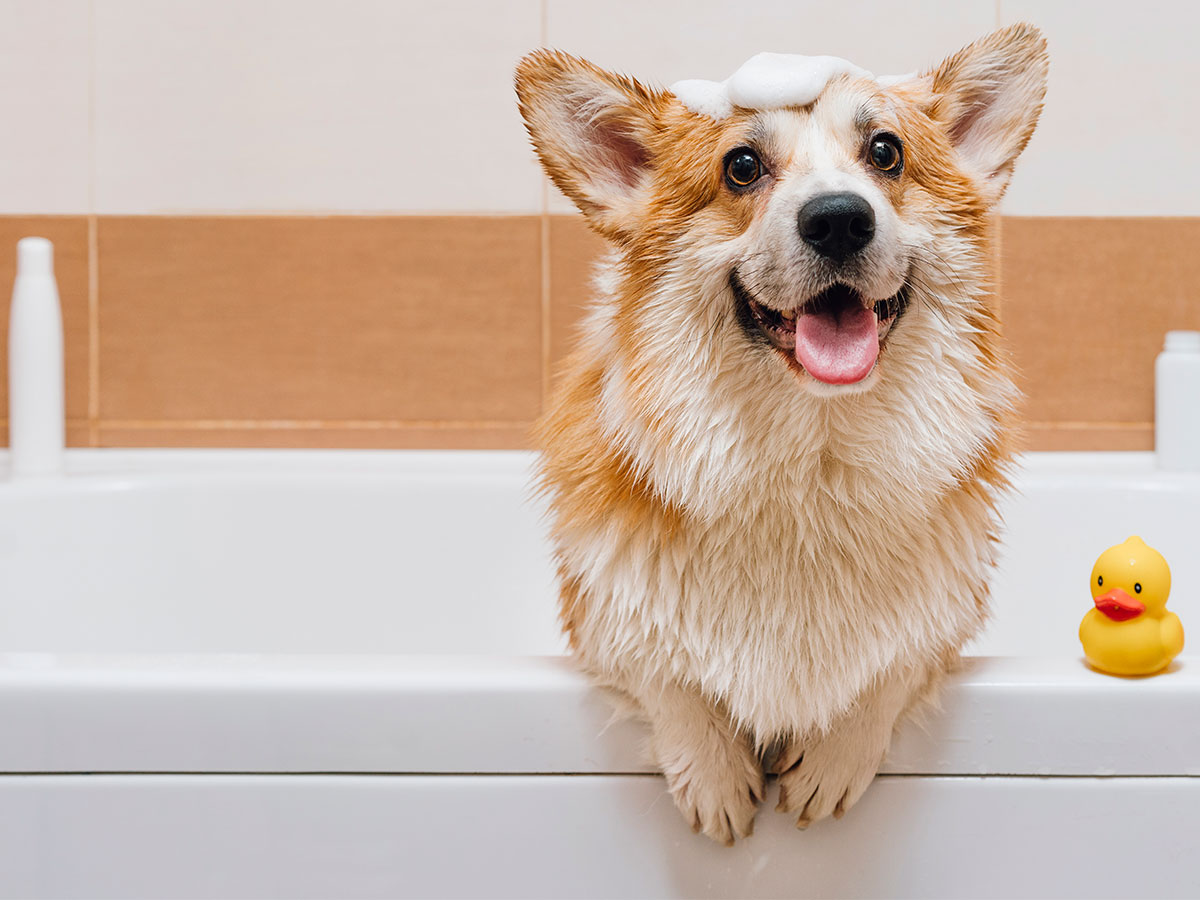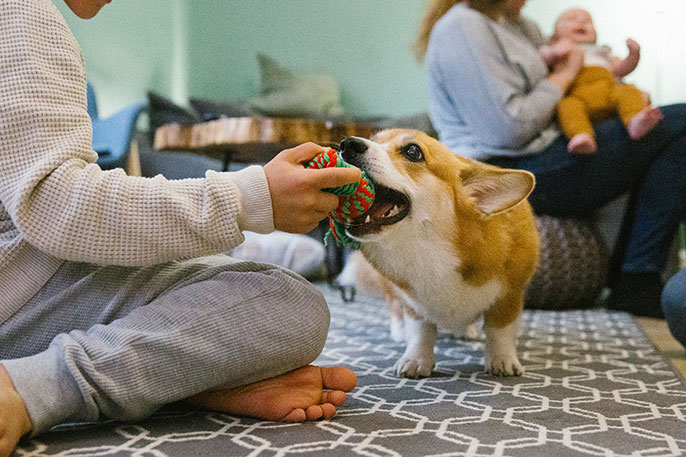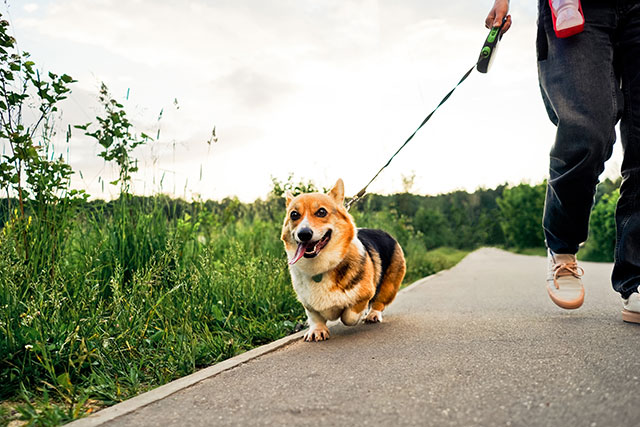
Corgi breed guide
Corgis are smart, friendly and undeniably adorable. Their friendly nature and small size make them excellent family pets. From grooming to exercise, learn how to keep your Corgi happy and healthy.
Breed information and advice
Corgis are small and sturdy, and due to their working background, they're highly intelligent and eager to please - making them a joy to train. These friendly little dogs love to be part of the family, easily fitting into households with children and other pets.
- Corgis shed regularly, so it's best to brush them at least once a day to remove any dead hair.Corgis shed regularly, so it's best to brush them at least once a day to remove any dead hair.
- They'll weigh between 11 and 14kg as an adult.They'll weigh between 11 and 14kg as an adult.
- A healthy corgi will usually live for 12 to 15 years.A healthy corgi will usually live for 12 to 15 years.

Recommended exercise and nutrition
Don't let their little legs fool you - Corgis need lots of exercise. Because they were originally bred for herding, they have bucket-loads of energy and stamina. The Kennel Club describes them as "a dog that was born busy and stays busy". They need at least one hour of exercise per day, including games to burn a lot of energy and stimulate their mind. They don't tire easily, and will happily join you on longer hikes.
Corgis don't have any specific dietary requirements, but will be happiest with a diet that's high in protein and fat. Choose a good quality dog food, feeding them two meals per day according to the packet instructions.

Common health problems and illnesses
To live a long and healthy life, Corgis need all of the standard vaccinations, dental checks and flea and tick treatments. There are also some illnesses this breed is prone to. It's worth being aware of them so that you can notice the symptoms early.
Intervertebral disc disease (IVDD) tops the list of common health issues. It occurs when the shock-absorbing discs between your dog's vertebrae gradually begin to harden until they are unable to cushion the vertebrae properly. This condition can cause a dog to be unable to walk and can seriously compromise their quality of life. When an intervertebral disc slips out of place (a slipped disc) it presses on the spinal cord, causes pain, nerve problems, and sometimes paralysis. Always contact your vet if your dog has symptoms of a slipped disc, it can be a very painful condition that can get a lot worse if it’s left untreated.
This serious nerve and spine condition affects the central nervous system, brain stem and spinal cord. Symptoms range from decreased muscle mass, muscular atrophy and posture issues to partial or full limb paralysis. Sadly there's no known cure for it, but there are ways to manage it to keep your Corgi comfortable.
This disorder stops blood from clotting properly, meaning your Corgi will bleed more than usual after an injury. This can lead to anaemia and dangerous levels of blood loss. Symptoms to look out for are random bleeding from the nose, genitals and gums. You may also see blood in their pee and poo, and they may bruise easily. This isn't usually a serious condition, and in most cases only requires mild treatment. Von Willebrand's disease is hereditary, so ask the breeder if the parents have been screened for it.
Cataracts are pretty widespread in the Corgi breed, more so as your Corgi ages. If you see a cloudy haze forming on your Corgi’s eyes, it might be cataracts. When a dog gets cataracts the lens clouds stopping light from reaching the back of the eye which impairs vision and is what can lead to blindness. Don’t let a cataract go without being managed, assessed, and treated by your vet.
Corgis are more likely to develop this painful condition, where clusters of minerals form in the bladder or kidneys. You might notice blood in their pee, as well as signs that they're having trouble urinating - for example straining when it's time to go, or if they simply can't. You might also notice that they lose their appetite, become lethargic and have a fever. Abdominal pain and vomiting are also common. Kidney and bladder stones are considered a medical emergency, so make sure you have pet insurance in place and call your vet right away.
Find out about insurance for your Corgi
Learn how pet insurance works and what kind of cover you might need for your dog.
Grooming advice
Grooming your Corgi is an excellent way to bond. Corgis are a short-haired breed, so aren't high-maintenance. They do shed regularly so, to keep their coat looking shiny and healthy, it's worth running a brush through it once a day. This has the added benefit of removing moulting hair before it ends up all over your clothes and furniture.
Corgis only need a bath once a month, max - they can easily go for two months without. Corgis have waterproof coats that are full of beneficial oils, and washing too often can strip these away. This could potentially lead to skin problems and excess shedding.
File or clip your Corgi's nails once every 3 to 4 weeks, and take time to check their eyes for gunky build-ups.
Fun and interesting facts
- The word 'Corgi' is Welsh for 'dwarf dog' - with 'cor' meaning 'dwarf' and 'gi' meaning 'dog'.
- According to Welsh folklore, Corgis are enchanted dogs from the land of the fairies. It's said that Fae warriors would ride these diminutive dogs into battle, and use them to pull their royal coaches.
- Queen Elizabeth II was known for her love of corgis, and owned more than 30 during her life.
- Amazon's first mascot was a Corgi named Rufus. He passed away in 2009, and the online shopping giant's Seattle campus has a building named after him.
- There are two different types of Corgi - the more popular Pembroke Welsh Corgi and the slightly larger Cardigan Welsh Corgi. They were recognised as different breeds in 1934.
Important information
The content on this page aims to offer an informative introduction to pet breeds, but does not constitute expert veterinary advice. If your dog or cat falls ill or has an injury, contact your vet immediately.
All facts and figures were correct at date of publication and were compiled using a range of sources.
Discover more breeds
Browse our other cat and dog guides to learn about some of the UK’s most popular breeds.